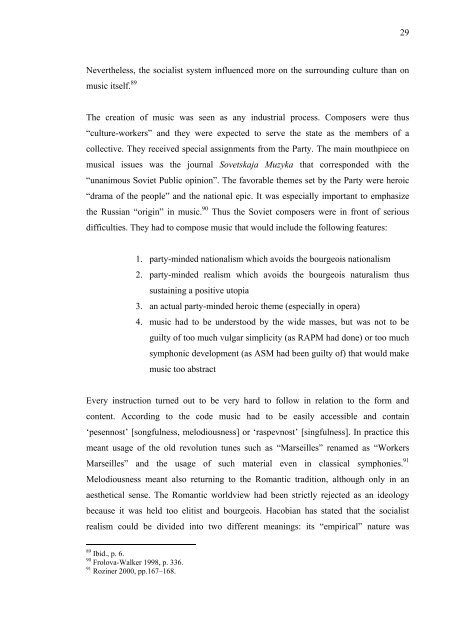Boris Asaf'ev and the Soviet Musicology - E-thesis
Boris Asaf'ev and the Soviet Musicology - E-thesis
Boris Asaf'ev and the Soviet Musicology - E-thesis
You also want an ePaper? Increase the reach of your titles
YUMPU automatically turns print PDFs into web optimized ePapers that Google loves.
Never<strong>the</strong>less, <strong>the</strong> socialist system influenced more on <strong>the</strong> surrounding culture than on<br />
music itself. 89<br />
The creation of music was seen as any industrial process. Composers were thus<br />
“culture-workers” <strong>and</strong> <strong>the</strong>y were expected to serve <strong>the</strong> state as <strong>the</strong> members of a<br />
collective. They received special assignments from <strong>the</strong> Party. The main mouthpiece on<br />
musical issues was <strong>the</strong> journal Sovetskaja Muzyka that corresponded with <strong>the</strong><br />
“unanimous <strong>Soviet</strong> Public opinion”. The favorable <strong>the</strong>mes set by <strong>the</strong> Party were heroic<br />
“drama of <strong>the</strong> people” <strong>and</strong> <strong>the</strong> national epic. It was especially important to emphasize<br />
<strong>the</strong> Russian “origin” in music. 90 Thus <strong>the</strong> <strong>Soviet</strong> composers were in front of serious<br />
difficulties. They had to compose music that would include <strong>the</strong> following features:<br />
1. party-minded nationalism which avoids <strong>the</strong> bourgeois nationalism<br />
2. party-minded realism which avoids <strong>the</strong> bourgeois naturalism thus<br />
sustaining a positive utopia<br />
3. an actual party-minded heroic <strong>the</strong>me (especially in opera)<br />
4. music had to be understood by <strong>the</strong> wide masses, but was not to be<br />
guilty of too much vulgar simplicity (as RAPM had done) or too much<br />
symphonic development (as ASM had been guilty of) that would make<br />
music too abstract<br />
Every instruction turned out to be very hard to follow in relation to <strong>the</strong> form <strong>and</strong><br />
content. According to <strong>the</strong> code music had to be easily accessible <strong>and</strong> contain<br />
‘pesennost’ [songfulness, melodiousness] or ‘raspevnost’ [singfulness]. In practice this<br />
meant usage of <strong>the</strong> old revolution tunes such as “Marseilles” renamed as “Workers<br />
Marseilles” <strong>and</strong> <strong>the</strong> usage of such material even in classical symphonies. 91<br />
Melodiousness meant also returning to <strong>the</strong> Romantic tradition, although only in an<br />
aes<strong>the</strong>tical sense. The Romantic worldview had been strictly rejected as an ideology<br />
because it was held too elitist <strong>and</strong> bourgeois. Hacobian has stated that <strong>the</strong> socialist<br />
realism could be divided into two different meanings: its “empirical” nature was<br />
89 Ibid., p. 6.<br />
90 Frolova-Walker 1998, p. 336.<br />
91 Roziner 2000, pp.167–168.<br />
29

















